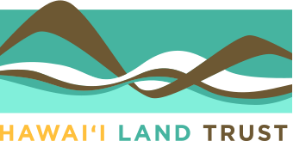Kuleana to Communities and the Land
This article was originally published in the Friday, October 16 issue of the Pacific Business News, written by Kelsey Kukaua.
When Pacific Business News last checked in with Hawaiian Islands Land Trust, the nature conservancy nonprofit had already begun modeling its budget for a possible 50% decrease in revenue for the year, which is normally more than $1 million. In March, HILT’s CEO Laura Kaakua made the decision to cut costs across the board, which led to its new projection of a $250,000 annual spending deficit due to the Covid-19 pandemic. HILT received $90,000 in U.S. Small Business Administration’s initial Paycheck Protection Program loans, which helped cover the costs for two months of payroll, rent, and utilities. Most recently, it was awarded funding through the Coronavirus Aid, Relief and Economic Security or CARES, Act to fill 40 to 49 open positions for land stewardship opportunities on Maui, Oahu, and Kauai, in addition to the organization’s already six fill-time and six part-time employees. This hiring influx during a pandemic, on top of managing staff and working with donors to maintain funding, has kept Kaakua busy - to say the least.
“It’s been strange as other sectors have shuttered, yet our work has sky-rocketed,” Kaakua told PBN. Prior to joining HILT in 2019, Kaakua spent nearly a decade at The Trust for Public Land. “I never knew what a land trust was and that tis kind of work was available,” she said. But growing up as a hula dancer and spending time surfing with her family, she knew from an early age that she wanted to pursue a career to care for the aina. She is a law school graduate and has focused her training in the areas of Hawaiian rights, real property law, and environmental law, which she said is put into practice every day in her work with other nonprofit partners.
Q&A:
What are some challenges your nonprofit is facing now?
Our biggest challenge is funding, but it’s made possible by our great team and board. We’re doing what we’ve dreamed of doing. There’s recognition of the value HILT is bringing to communities throughout Hawaii. We’ve seen some pivot in local foundations that are giving more to social service providers, and we understand - at the end of the day, we’re all in this together.
What effect did the second shutdown have on you?
It affected our monthly workdays and “talk story on the land” hikes [due to larger groups unable to meet up]. Our work to connect people to the land was also affected, primarily working with local schools stopped, along with school field trips. We had to arrange for smaller groups to come out and equip educators to figure out virtual teaching lessons.
What are you doing to prepare for Hawaii’s reopening?
We want to see an increase in local residents going to the preserves along the coast, while also expecting numbers to increase back to a mix of tourists and residents [once tourism reopens]. For now, we’ll continue to focus on messaging on how to stay safe. We want to change the perspective of folks enjoying natural places in Hawaii and encourage them to give back to it by instilling kuleana for the place that they’re in.
What is the best advice you ever received?
When there’s an absence of joy, it’s an indicator that something is wrong. That’s important in our work - protecting a coastline, etc. Our work is hard work in terms of the process of protecting a place and stewardship work can be grueling. As a team, we try to celebrate one another’s wins. We often think of the joy of others in the community, that they will get to have joy as a result of our work.
What are your goals for the rest of 2020?
To maintain our financial resources to continue the work we’re doing, with specific focus on stewarding our preserves to keep them safe, free and open to the public. Also focusing in protecting agricultural land and coastlines, helping farmers and ranchers and keeping communities connected.

